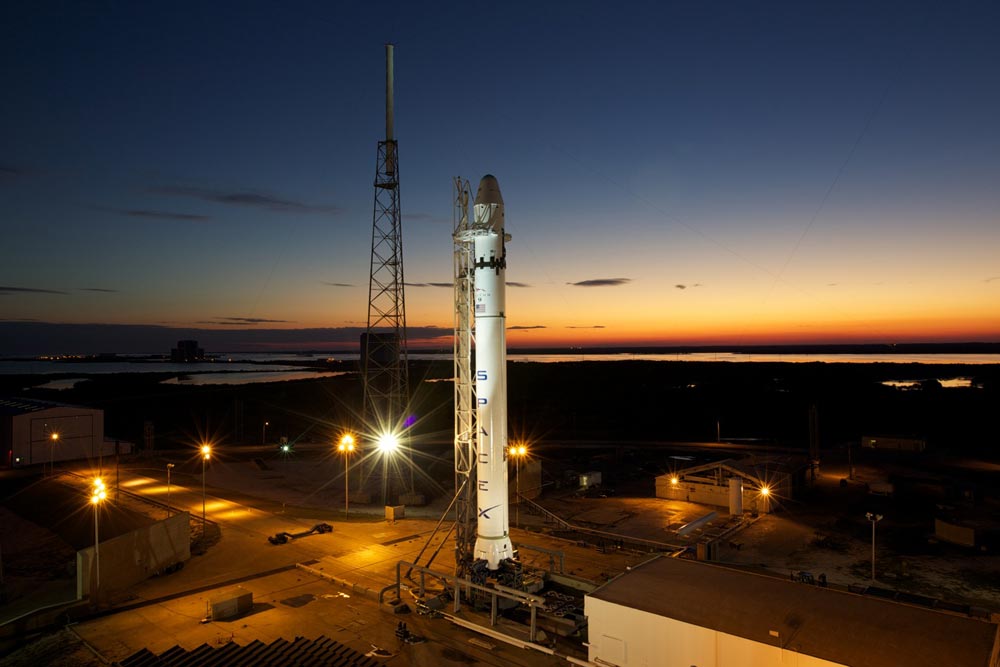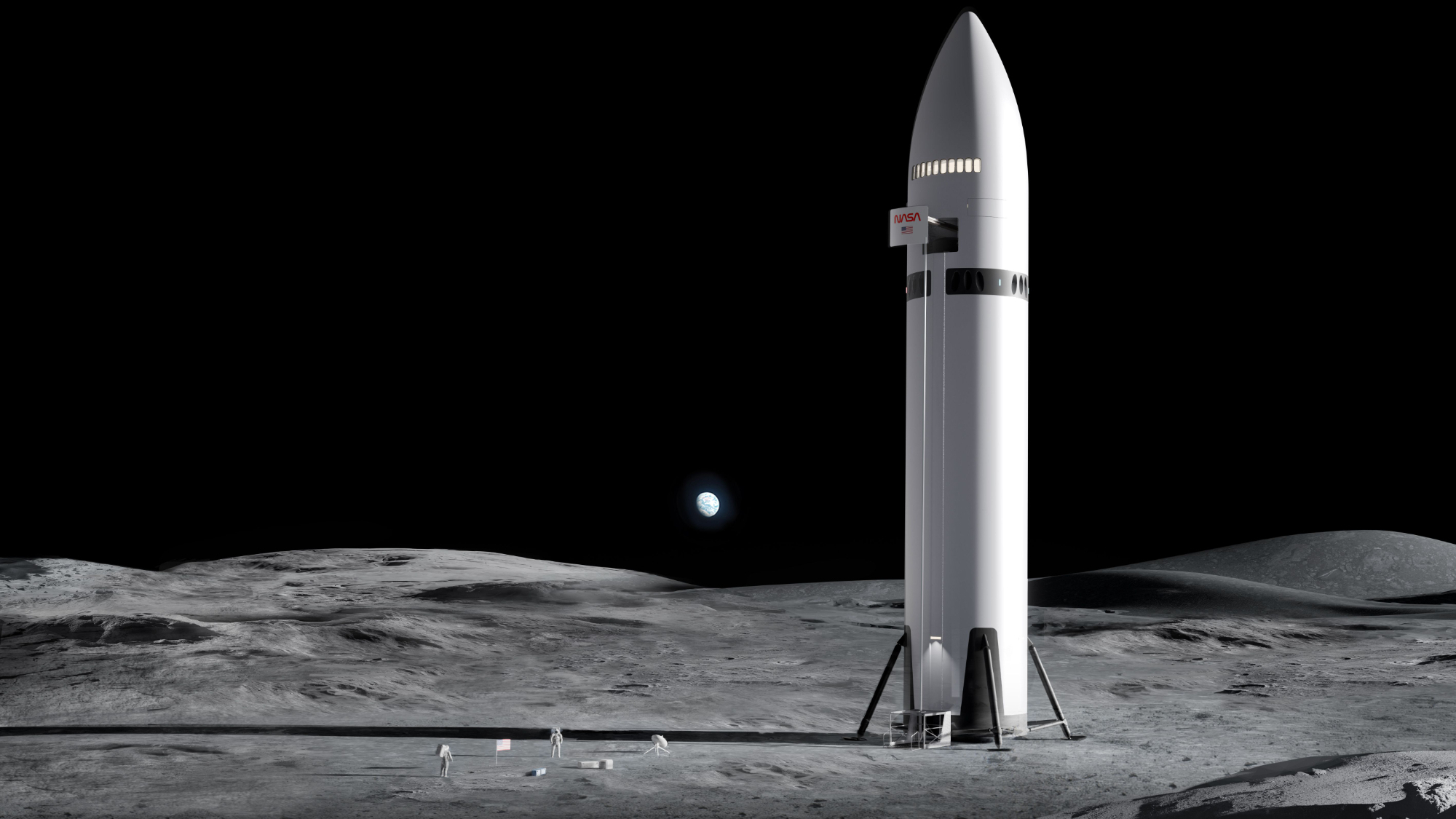SpaceX's New Rocket At Launch Pad for Final Tests

Breaking space news, the latest updates on rocket launches, skywatching events and more!
You are now subscribed
Your newsletter sign-up was successful
Want to add more newsletters?

Delivered daily
Daily Newsletter
Breaking space news, the latest updates on rocket launches, skywatching events and more!

Once a month
Watch This Space
Sign up to our monthly entertainment newsletter to keep up with all our coverage of the latest sci-fi and space movies, tv shows, games and books.

Once a week
Night Sky This Week
Discover this week's must-see night sky events, moon phases, and stunning astrophotos. Sign up for our skywatching newsletter and explore the universe with us!

Twice a month
Strange New Words
Space.com's Sci-Fi Reader's Club. Read a sci-fi short story every month and join a virtual community of fellow science fiction fans!
A new rocket built by a California-based company tolaunch commercial spacecraft on cargo trips to the International Space Station forNASA is poised atop its Florida launch pad for some final tests.
The two-stage Falcon 9 rocket built by Space ExplorationTechnologies (SpaceX) was hoisted into vertical launch position at the CapeCanaveral Air Force Station Saturday in preparation for its maiden test flight laterthis year. The company is one of two firms contracted by NASA to provideunmanned cargo shipments to the spacestation on commercially built spaceships.
The medium-lift Falcon 9 rocket is the second boosterdeveloped by the Hawthorne, Calif.-based SpaceX, which was founded by PayPalco-founder and entrepreneur Elon Musk.
The company?s smaller Falcon 1 rocket completed itssecond successful launch into orbit last year. It was the fifth launch of aFalcon 1, which suffered three failures before hitting success on try numberfour. A Malaysian satellite rode the fifth Falcon 1 rocket to orbit in lastsummer?s flawless launch.
Liftoff of the first Falcon9 rocket is expected to come sometime in the next few months, possibly byMay, SpaceX officials have said. But the final launch date hinges on successfulsystems and engine checks.
Fueling rehearsals, called a wet dress, and a short,3.5-second static test firing of the Falcon 9?s first stage engines are thenext major milestones.
?SpaceX has not set specific dates for wet dress or static fire as [the] schedule will be driven by the satisfactory completion ofall test objectives and a thorough review of the data,? SpaceX officials said ina Sunday update.
Breaking space news, the latest updates on rocket launches, skywatching events and more!
This is not the first time SpaceX has hauled its 180-foot(55-meter) Falcon 9 rocket vertical atop its launch pad. The company assembledand moved its first Falcon 9 to pad in January 2009 as part of integrationtests.
But this year SpaceX aims to launch its first Falcon 9missions. The rocket is designed to haul SpaceX?s unmanned Dragonspacecraft, which the company plans to use to fly 12 cargo missions to the spacestation under a $1.6 billion contract with NASA.
Another company, Virginia-based Orbital Sciences, isbuilding its own Cygnus spacecraft and the Taurus 2 rocket to launch eight unmannedcargo flights to the space station under a separate $1.9-billion contract.
Both companies have expressed an interested in modifyingtheir vehicles to carry astronauts. NASA is banking on commercialspacecraft arising to ferry astronauts to orbit since its Constellationprogram in charge of replacing the shuttle fleet with new rockets and vehicleswas cancelled earlier this month.
- SPACE.comVideo Show - The Industrial Revolution in Space
- SpaceStation 98% Complete with 4 Shuttle Flights Remaining
- Video- SpaceX's Vision for Manned Dragon Spaceship

Tariq is the award-winning Editor-in-Chief of Space.com and joined the team in 2001. He covers human spaceflight, as well as skywatching and entertainment. He became Space.com's Editor-in-Chief in 2019. Before joining Space.com, Tariq was a staff reporter for The Los Angeles Times covering education and city beats in La Habra, Fullerton and Huntington Beach. He's a recipient of the 2022 Harry Kolcum Award for excellence in space reporting and the 2025 Space Pioneer Award from the National Space Society. He is an Eagle Scout and Space Camp alum with journalism degrees from the USC and NYU. You can find Tariq at Space.com and as the co-host to the This Week In Space podcast on the TWiT network. To see his latest project, you can follow Tariq on Twitter @tariqjmalik.
